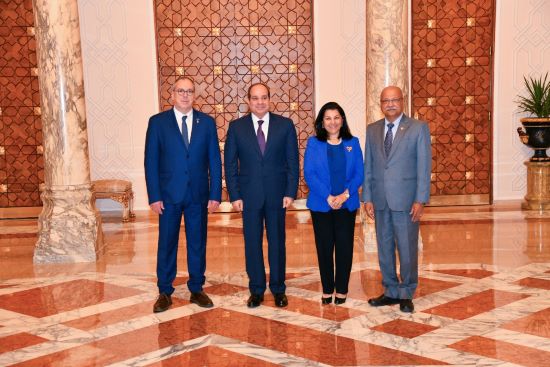 Egypt's Presidency
Egypt's Presidency
Following a series of virtual meetings on assistive technology with WHO and the International Society for Prosthetics and Orthotics (ISPO), Egypt's President H.E. Abdel-Fattah El-Sisi requested a WHO mission to support Egypt’s goal of leaving no one behind and realizing the rights of people with locomotor disability to enjoy health and well-being.
Assistive technology refers to the delivery of assistive products and services that maintain or improve an individual’s functioning and independence, thereby promoting their well-being, including, for example, hearing aids, wheelchairs, or prostheses.
The United Nations Development Programme (UNDP) estimates that there are 12 million people living with disabilities in Egypt, and while there is lack of country-specific data on the availability of assistive technology, it is estimated that globally only 1 in 10 people in need have access to assistive products.
One of the President's key initiatives is to establish an industrial complex for prosthetics and orthotics assistive technology that will enable Egypt to become an internationally-recognized physical rehabilitation centre to both meet national needs and be a regional hub for manufacturing and service provision. The first phase will focus on people with locomotor disability.
As well as a desk review and virtual meetings, the WHO mission conducted field visits to several health care facilities across different governorates to assess the opportunities for integrating assistive technology services within the current essential services packages. Subsequently, the mission held a series of plenary discussions and presentations with the different government stakeholders.
Headed by the WHO Representative in Egypt, Dr Naeema Al Gasseer, the WHO Team Lead for Assistive Technologies and Medical Devices, Dr Chapal Khasnbis and the President of ISPO, Dr Claude Tardif, the WHO team met with President El-Sisi, Egypt's Prime Minister H.E. Dr Mostafa Madbouly, the Minister of Health and Population, Dr Khaled Abdel Ghaffar, and other relevant ministers and heads of national entities.
In response to the President’s call for action, Dr Al Gasseer said, “WHO's Constitution recognizes the highest attainable standard of health as a fundamental right of every human being, a concept that is aligned with Egypt’s Vision 2030. President El-Sisi stressed the importance of expediting support to this large category of persons with disabilities to allow them to live healthy and productive lives with a positive return for their communities, societies and economies".
“We commend Egypt’s efforts to leave no one behind. WHO stands ready to provide the support needed, with its partners, to assist not only the 12 million people living with disabilities in Egypt but also the estimated 36 million people who are affected by disability in Egypt, given the impact of disability on the families of these individuals,” she added.
The mission together with a national committee has identied the steps to be taken immediately, a plan for the way forward and the means to mobilize the necessary technical and financial support.


